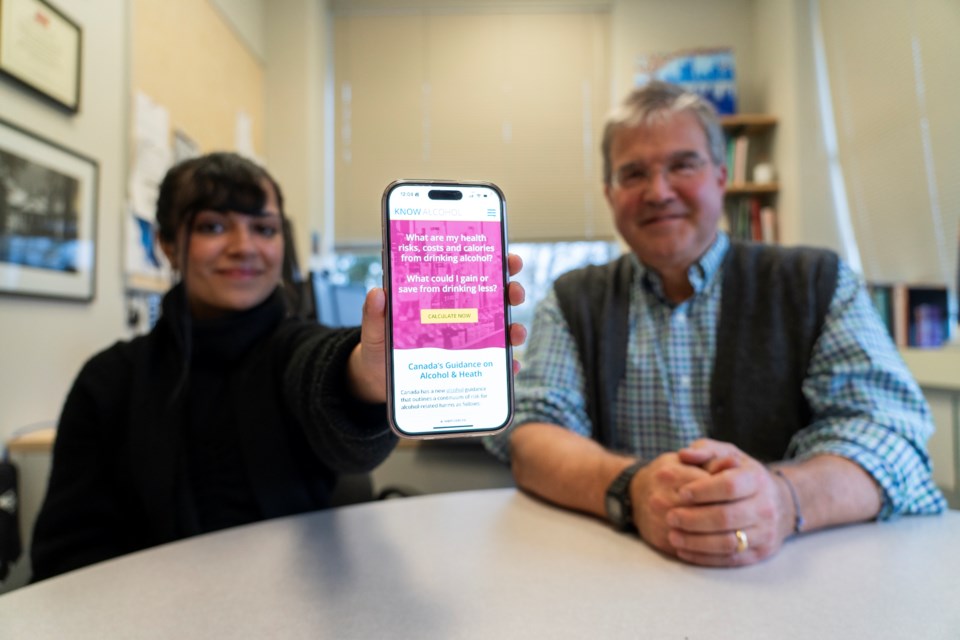Researchers from the University of Victoria (UVic) have launched a new tool to help people understand the risks of alcohol consumption and the benefits of reducing it, just in time for New Year's resolutions or Dry January.
UVic’s Canadian Institute for Substance Use Research (CISUR) launched a website, Know Alcohol, on Jan. 1. The website has educational tools and a calculator for personalized health outcome estimates when consuming alcohol, using updated Canadian Centre on Substance Use and Addiction (CCSUA) guidelines.
In 2023, CCSUA released evidence-based guidelines which replaced Canadian guidelines from 2011. The advice shows zero drinks produces positive health benefits. Two or less standard drinks in a week is considered low risk, meaning it’s unlikely alcohol consumption is consequential to an individual’s health. Three to six standard drinks in a week increases cancer risk, and seven or more “significantly” increases cancer risks.
Know Alcohol takes these guidelines and personally tailors evidence-based advice for consumers. Priya Johal, research associate for CISUR, said personalized information “is the trajectory of medical and quality of life information.”
“Given the advancement in technology of late, ads we see online are tailored to our demographics. People can relate more when it’s based on their age, gender and drinking habits, versus seeing messaging applied broadly. Knowing individual risk like cancer or cardiovascular disease really situates people in terms of their personal impacts,” Johal said.
To add to the personalized approach, researchers also incorporated benefits from alcohol reduction based on research showing negative feedback doesn’t always work.
“Newer research shows leading with the gains and benefits of adjusting lifestyle or health resonates with people," Johal said. "It reduces the barrier. It can be confronting if people have high risks or drink a lot, so we really wanted to emphasize the calculator can show you the benefits of even just one less drink a week.”
And since not everyone is motivated by health benefits, the calculator includes financial estimates of money saved and calories reduced.
On launch day, the site had more than 15,000 unique visitors, and more than 300 people have completed a feedback survey, with plenty of heartfelt messages from survey respondents, according to Johal.
In addition to using the online tool, there are Whistler resources which can support people making plans to shift their alcohol consumption.
Local access to alcohol harm-reduction
Whistler Community Services Society’s (WCSS) outreach service team is available Monday through Saturday from 9 a.m. to 6 p.m. Jackie Dickinson, WCSS’ executive director, said someone is always available on-site during operating hours if people want to chat.
There is no clearly defined route for care when accessing a free assessment. Dickinson said they start by focusing on an individual's desired changes and noted that while abstinence may work for some people, it isn’t a one-size-fits-all approach.
“I think dry January is a great start for some people, but we also know that an abstinence-based approach to substances can sometimes be harmful to people and cause health complications," she said. "If that’s the path someone wants to take, we can provide abstinence-based programming referrals like Alcoholics Anonymous or working with their family physician to look at what that might look like.
“But we are at a time in our health-care in our province where we are also encouraging harm reduction, so looking at some ways to reduce harm, maybe potentially reduce consumption for them.”
WCSS outreach workers check to see if the visitor has or needs a family doctor and look at their access to clinical counselling or psychiatric support. If visitors are financially restricted, WCSS has a counselling assistance program to help offset some of the costs.
They help visitors redefine their support network and can suggest programs like the Late Unique Nighttime Alternatives (LUNA) program in Whistler. LUNA is a non-profit group running out of the Maury Young Arts Centre, creating space for alcohol-free connectivity.
“I often think about the fact that all of us are craving a strong sense of community and a strong sense of belonging," Dickinson said. "So, when we talk to someone about changing anything in their life, we want to reinforce the people, opportunities, or places in their life that can reinforce that positive sense of belonging.”
Alcohol’s cancer risk
Similarly to the creators of Know Alcohol and staff at WCSS, Whistler 360’s Dr. Karin Kausky said she takes an individualized approach to patients seeking advice for alcohol consumption while recognizing advice has changed.
“I think it's something that’s seen evolution," she said. "There is an increased risk of certain cancers with alcohol; it's colon cancer, breast cancer [and others]. I’ll talk with somebody about their family history and any genetic mutations they might have, determining their baseline risk. It's really a conversation, and I feel like it's my job to give people information but not tell them what to do."
With more research on alcohol's impact on health outcomes, Kausky said youth are shifting their relationship with the substance, which is influencing industry trends, with alcohol-free options like mocktails and de-alcoholized beer growing in popularity.
“That’s probably driven by public demand and recognition of the risks associated with alcohol,” Kausky said.
Cancer risk recently led to the U.S. surgeon general calling for cancer warning labels on alcohol, similar to those on tobacco products because of the direct cancer link.
Kausky said if Canada adopted alcohol warning labels, the move would be in line with evidence-based knowledge on the associated risks. Johal also echoed the call from our southern health-care leader.
“CISUR has been since its inception in support of warning labels on alcoholic beverages in Canada and globally," she said. "So many other products have information for nutrition, or cigarette packages have cancer warnings. All these other substances have information for consumers to be informed. Why is alcohol the one that doesn’t have that? People have the right to know how alcohol’s harms."
To learn more about alcohol’s health impacts and benefits from reducing consumption, visit Know Alcohol.




